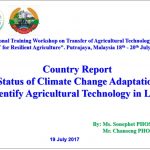
26 downloads
Title of document: Country Report Status of Climate Change Adaptation and Identify Agricultural Technology in Lao PDR Authors: Ms. Sonephet PHOSALATH (MONRE), Mr. Chanseng PHONGPACHITH (MAF) Journal’s name if any: Ministry/Government Agency/Organisation: MONRE, MAF Year of publication: 2017 Geographic focus: Lao PDR Main issues / topics addressed (for example: Country Profile; Disasters and Climate Change; Transfer of Agricultural Technology in Lao PDR; General Exchange & Sharing……) School of agroecology (if any): Web address to original document (if any): Summary: The presentation of the “CAPSA-MARDI Regional Training Workshop on Transfer of Agricultural Technology with Specific Focus on "Application of ICT for Resilient Agriculture". Putrajaya, Malaysia 18th - 20th July 2017” Read More
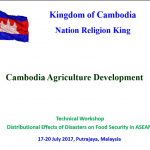
18 downloads
Title of document: Cambodia Agriculture Development Authors: Journal’s name if any: Ministry/Government Agency/Organisation: Kingdom of Cambodia Year of publication: 2017 Geographic focus: Cambodia Main issues / topics addressed (for example: Cambodia Agricultural Development 2016; National Perspective on Food Security and Future Agriculture in Cambodia; National Strategy for Food Security and Nutrition 2014-2018……) School of agroecology (if any): Web address to original document (if any): Summary: The presentation of the “Technical Workshop Distributional Effects of Disasters on Food Security in ASEAN, 17-20 July 2017, Putrajaya, Malaysia” Read More
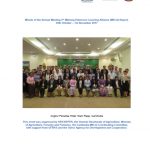
10 downloads
Title of document: Minute of the Annual Meeting 3rd Mekong Extension Learning Alliance (MELA) Report, 30th October – 1st November 2017, Cambodia Authors: HEKS/EPER Journal’s name if any: Ministry/Government Agency/Organisation: HEKS/EPER, GFRAS, Swiss Agency for Development and Cooperation, MELA, MAFF Year of publication: 2017 Geographic focus: Mekong Region Main issues / topics addressed (for example: Country presentations on new policy, innovations, challenging which are concerning to agricultural extension and rural advisory service; A panel discussion on Pesticides Impacts to Health and Environment facilitated ……) School of agroecology (if any): Web address to original document (if any): Summary: The 3rd Annual Meeting of the Mekong Extension Learning Alliance (MELA) was held from 30 October to 1st November, 2017, at Angkor Paradise Hotel in Siem Reap, Kingdom of Cambodia. It gathered participants from every country in the Mekong region MELA brings together agricultural extension and rural advisory service providers from five countries linked by the Mekong River. The Mekong River passes through Yunnan province of China and five countries in South East Asia: Myanmar, Laos, Thailand, Cambodia and Vietnam. Agricultural extension and rural advisory services in the Mekong Region have many features in common. This network was established in 2015 following discussions at the meeting held in Hanoi in 2013 on ‘Reaching the Millions’ in Hanoi. The main objectives of the MELA meeting were: to share information, knowledge, experience, and best practices in advisory services among Mekong Region countries and institutions involved in agricultural and rural development; and to provide a space for reflection, hands-on peer support and learning. This event was organised by HEKS/EPER, the General Directorate of Agriculture, Ministry of Agriculture, Forestry and Fisheries, the Cambodia MELA Coordinating Committee, with support from GFRAS and the Swiss Agency for Development and Cooperation Read More
6 downloads
Title of document: Adoption of Organic Rice for Sustainable Development in Bangladesh Authors: Shaikh Tanveer Hossain, Hideki Sugimoto, Hideto Ueno and Sheikh Mohammed Rafiul Huque Journal’s name if any: Journal of Organic Systems – Vol.2 No.2, 2007 Ministry/Government Agency/Organisation: Ehime University, JOS Year of publication: 2007 Geographic focus: Bangladesh Main issues / topics addressed (for example: Introduction; Materials and Methods; Results and Discussion; Conclusion……) School of agroecology (if any): Web address to original document (if any): Summary: Bangladesh now needs to thank its soil health, environment and human health for the country being almost self-sufficient in rice production. The present study has been undertaken to gain knowledge of the level of awareness by farmers and consumers regarding the status of organic rice, and knowledge of demand and marketing opportunities and limitations for organic rice in the country. The present study has highlighted the overall organic rice situation in Bangladesh, which is not yet well documented. The results also demonstrate that farmers and consumers are aware of the hazards of chemical compounds but have little knowledge about organic rice. The present study may open a new window for organic rice research and marketing (both local and export) for all stakeholders (including planners) and could succeed in the adoption of organic rice in Bangladesh. Read More
15 downloads
Title of document: Effect of Integrated Rice-Duck Farming on Rice Yield, Farm Productivity and Rice-Provisioning Ability of Farmers Authors: Shaikh Tanveer Hossain, Hideki Sugimoto, Gazi Jashim Uddin Ahmed, Md. Rafiqul Islam Journal’s name if any: Asian Journal of Agriculture and Development, Vol. 2, No. 1 Ministry/Government Agency/Organisation: Ehime University, Bangladesh Rice Research Institute, Bangladesh, AJAD Year of publication: Geographic focus: Bangladesh Main issues / topics addressed (for example: Introduction; Materials and Methods; Results and Discussion; Conclusion……) School of agroecology (if any): Web address to original document (if any): Summary: The feasibility of the rice-duck system of rice production, practiced in some East Asian countries, is studied in Bangladesh as a sub-project of the Poverty Elimination Through Rice Research Assistance (PETRRA). The Bangladesh Rice Research Institute (BRRI) implements the sub-project in collaboration with two NGOs, FIVDB and BDS, in the northeastern (greater Sylhet) and southern (Barisal) regions of the country. Each demonstration trial, conducted in the field of the farmers, is treated as a replication. In these trials, the rice-duck system is compared with the methods of growing rice solely, as traditionally practiced by the farmers in Bangladesh. Evaluation of the activities carried out under the PETRRA sub-project shows that the rice-duck system is not only feasible, but also economically rewarding for the farmers. The yield of rice is, on average, 20% higher in the rice-duck system than the traditional rice system (sole rice), thereby ensuring about 50% higher net return and rice-provisioning ability. The ducks in the rice-duck fields control weeds and insects very effectively; as a consequence, labor and pesticide costs for controlling weeds and insects are minimized and the soil health is improved. The ducks provide another source of added income for the farmers. In view of the favorable results obtained in the study, it might be suggested that the rice-duck system be spread throughout the country as an income-generating activity for the resource-poor farmers. Read More
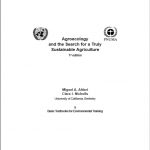
21 downloads
Title of document: Agroecology and the Search for a Truly Sustainable Agriculture - 1st edition Authors: Miguel A. Altieri and Clara I. Nicholls Journal’s name if any: Ministry/Government Agency/Organisation: UN; PNUMA; University of California Year of publication: 2005 Geographic focus: Global level Main issues / topics addressed (for example: Modern Agriculture: Ecological impacts and the alternatives to conventional farming; Agroecology: principles and strategies for designing sustainable farming systems; the ecological impacts of transgenic crops; an agroecological basis for insect pest management……) School of agroecology (if any): Web address to original document (if any): Summary: There is increasing evidence that warns that the growing push toward industrialization and globalization of the world’s agriculture and food supply imperils the future of humanity and the natural world. Industrial agriculture which is corporate controlled, and promotes agrochemically based, monocultural, export-oriented systems are negatively impacting public health, ecosystem integrity, food quality and nourishment, traditional rural livelihoods, and indigenous and local cultures, while accelerating indebtedness among millions of farmers, and their separation from lands that have historically fed communities and families. This transition is increasing hunger, landlessness, homelessness, despair and suicides among farmers. Meanwhile, it is also degrading the planet’s life support systems, and increasing alienation of peoples from nature and the historic, cultural and natural connection of farmers and all other people to the sources of food and sustenance. Finally, it is also destroying the economic and cultural foundations of societies, undermines security and peace, and creates a context for social disintegration and violence. By confronting myth with reality, the objective of this book is to challenge the false promises made by the genetic engineering industry. The industry has promised that genetically engineered crops will move agriculture away from a dependence on chemical inputs, increase productivity, decrease input costs, and help reduce environmental problems (Office of Technology Assessment, 1992). Another agriculture is not only possible, it is already happening taking a multitude of expressions of alternative agriculture, from various variations of organic agriculture to more peasant based, subsistence oriented traditional agriculture. In this book we explore the extent, features and ecological, social and economic benefits of both forms of sustainable agriculture. In this report the agroecological features of organic agriculture as practiced in North America and Europe, and of traditional agriculture involving millions of small farmers and/or peasants in the developing world are described with emphasis on their contribution to food security, conservation/ regeneration of biodiversity and natural resources and economic viability. The book also depicts an agroecological path to reach a truly sustainable, biodiverse and socially just agriculture Read More
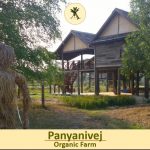
16 downloads
Title of document: Panyanivej Organic Farm Authors: Panyanivej Organic Farm Journal’s name if any: Ministry/Government Agency/Organisation: Panyanivej Organic Farm Year of publication: 2018 Geographic focus: Laos Main issues / topics addressed (for example: Background; Our concerns and principle; Our Practice; Success and Challenge……) School of agroecology (if any): Web address to original document (if any): Summary: This presentation for brief introduction Panyanivej Organic Farm for Thematic Workshop “Bringing Agroecology to the Market: Innovative Market Approaches and Institutional Settings to accompany the agroecological transition”, 9th February 2018, Vientiane, Lao PDR Read More
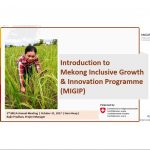
26 downloads
Title of document: Introduction to Mekong Inclusive Growth & Innovation Programme (MIGIP) Authors: Rajiv Pradhan Journal’s name if any: Ministry/Government Agency/Organisation: MIGIP, Swisscontact Year of publication: 2017 Geographic focus: Mekong Region Main issues / topics addressed (for example: What is MIGIP?; MIGIP’s approach in TechMark; TechMark’s Partners & MIGIP Team……) School of agroecology (if any): Web address to original document (if any): Summary: This presentation for Mekong Extension Learning Alliance 3rd MELA meeting, at Angkor Paradise Hotel, Siem Reap on 30 October – 1st November 2017, Cambodia Read More
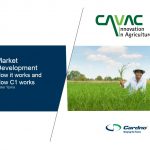
9 downloads
Title of document: Market Development How it works and How C1 works Authors: Pieter Ypma Journal’s name if any: Ministry/Government Agency/Organisation: CAVAS, Cardno Year of publication: 2017 Geographic focus: Cambodia Main issues / topics addressed (for example: Market access what does it mean; Where to begin?; C1 sequence……) School of agroecology (if any): Web address to original document (if any): Summary: This presentation for Mekong Extension Learning Alliance 3rd MELA meeting, at Angkor Paradise Hotel, Siem Reap on 30 October – 1st November 2017, Cambodia Read More
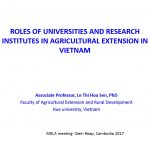
13 downloads
Title of document: Roles of Universities and research institutes in agricultural extension in Vietnam Authors: Le Thi Hoa Sen Journal’s name if any: Ministry/Government Agency/Organisation: Hue University Year of publication: 2017 Geographic focus: Vietnam Main issues / topics addressed (for example: Introduction to Agricultural extension (AE) systems in Vietnam; Main extension activities; Roles of research institutes and universities in AE; Strengths, opportunities, weaknesses and challenges of the current extension system in Vietnam……) School of agroecology (if any): Web address to original document (if any): Summary: This presentation for Mekong Extension Learning Alliance 3rd MELA meeting, at Angkor Paradise Hotel, Siem Reap on 30 October – 1st November 2017, Cambodia Read More

 Asia & Mekong Region
Asia & Mekong Region  Cambodia
Cambodia  Laos
Laos  Myanmar
Myanmar  Other
Other  Vietnam
Vietnam